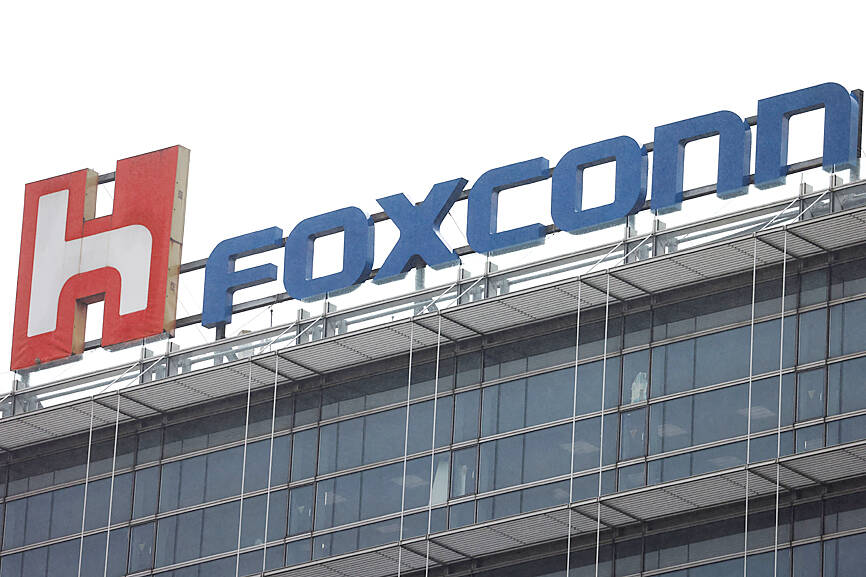More than 20,000 employees at Apple Inc supplier Foxconn Technology Group’s (富士康) huge Chinese plant, mostly new hires not yet working on production lines, have left, a Foxconn source familiar with the matter said yesterday.
The departures from the world’s largest iPhone factory dealt a fresh blow to the Taiwanese company, which has been grappling with strict COVID-19 restrictions that have fueled worker discontent and disrupted production ahead of Christmas and January’s Lunar New Year holiday.
Concerns are mounting over Apple’s ability to deliver products for the busy holiday period as the worker unrest lingers at the Zhengzhou plant, which produces the US company’s iPhone 14 models.

Photo: REUTERS
The departures could complicate Foxconn’s target of resuming full production by the end of this month, after the sometimes violent unrest, the source said.
In a rare case of open dissent in China, employees have complained about sharing dormitories with colleagues who tested positive for COVID-19.
They say they were misled over compensation benefits at the factory, which accounts for 70 percent of global iPhone shipments.
Foxconn on Thursday offered 10,000 yuan (US$1,395) to protesting recruits who agreed to resign and leave the plant.
The company apologized for a pay-related “technical error” when hiring, which workers say was a factor that led to protests involving clashes with security personnel.
Videos posted on Chinese social media yesterday showed crowds and long lines of luggage-laden workers waiting for buses.
“It’s time to go home,” one person posted.
Another Foxconn source familiar with the matter said some new hires had left the campus, but did not elaborate on how many.
This person said the departures had no impact on current production, as the new staff still needed to take training courses before working online.
“The incident has a big impact on our public image, but little on our capacity. Our current capacity is not affected,” the source said.

In Italy’s storied gold-making hubs, jewelers are reworking their designs to trim gold content as they race to blunt the effect of record prices and appeal to shoppers watching their budgets. Gold prices hit a record high on Thursday, surging near US$5,600 an ounce, more than double a year ago as geopolitical concerns and jitters over trade pushed investors toward the safe-haven asset. The rally is putting undue pressure on small artisans as they face mounting demands from customers, including international brands, to produce cheaper items, from signature pieces to wedding rings, according to interviews with four independent jewelers in Italy’s main

Macronix International Co (旺宏), the world’s biggest NOR flash memory supplier, yesterday said it would spend NT$22 billion (US$699.1 million) on capacity expansion this year to increase its production of mid-to-low-density memory chips as the world’s major memorychip suppliers are phasing out the market. The company said its planned capital expenditures are about 11 times higher than the NT$1.8 billion it spent on new facilities and equipment last year. A majority of this year’s outlay would be allocated to step up capacity of multi-level cell (MLC) NAND flash memory chips, which are used in embedded multimedia cards (eMMC), a managed

Japanese Prime Minister Sanae Takaichi has talked up the benefits of a weaker yen in a campaign speech, adopting a tone at odds with her finance ministry, which has refused to rule out any options to counter excessive foreign exchange volatility. Takaichi later softened her stance, saying she did not have a preference for the yen’s direction. “People say the weak yen is bad right now, but for export industries, it’s a major opportunity,” Takaichi said on Saturday at a rally for Liberal Democratic Party candidate Daishiro Yamagiwa in Kanagawa Prefecture ahead of a snap election on Sunday. “Whether it’s selling food or

In the wake of strong global demand for AI applications, Taiwan’s export-oriented economy accelerated with the composite index of economic indicators flashing the first “red” light in December for one year, indicating the economy is in booming mode, the National Development Council (NDC) said yesterday. Moreover, the index of leading indicators, which gauges the potential state of the economy over the next six months, also moved higher in December amid growing optimism over the outlook, the NDC said. In December, the index of economic indicators rose one point from a month earlier to 38, at the lower end of the “red” light.